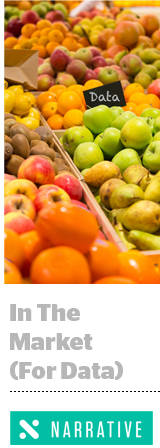
Data buyers and sellers have communication issues.
“Transacting data across industries and use cases is actually a quite difficult process,” said Nick Jordan, CEO and founder of data startup Narrative I/O, which released a feature called Discover on its platform Monday that aims to help publishers get their data in front of interested buyers.
Narrative is a “data commercialization platform” that helps sellers price and package their data, and Discover serves as the self-service storefront where buyers can browse and select the data they need.
“The goal is to make it easier for people to monetize and consume data anywhere that needs to happen,” said Jordan, who spent three years as SVP of product and strategy at Tapad before leaving to found Narrative in 2016.
Through Discover, Narrative curates lists of data sets for particular use cases and provides recommendations on what data to buy. A luxury brand, for example, could tap into a data package of people who have been to one of 50 luxury retailers and visited certain websites within the last 30 days.
The tool also provides transparency into the makeup of a data set.
“If you go to a typical third-party exchange, they’ll give you 10 million or however many cookies for ‘luxury consumers,’” Jordan said. “But we’ll tell the buyer which applicable apps someone has on their phone, what stores they go to, which websites they visit.”
Without knowing the ingredients, it’s hard to judge the quality.
“You can see what’s in there so we wouldn’t have to dig into the back end of how they’re mining the data,” said Michael Lieberman, chief strategy officer at Kinetic Worldwide, WPP’s out-of-home media-buying agency, which is on the cusp of running a test with Narrative’s tech.
“We want the freedom to identify which data points we’d like to use to create an audience, the freedom to merge data sets and we want to know that there’s a quality standard sitting behind it,” Lieberman said.
But it’s not always easy for a sell-side player to tick all those boxes on its own or to get their data in front of the right buyer.
Smaller players often don’t have the manpower to move as quickly as they need to, said Josh Anton, CEO of X-Mode, a location data company that collects data through an SDK and its own apps such as Drunk Mode, which lets users track their friends using GPS to make sure everyone gets home all right after a night out.
X-Mode, which also aggregates location data purchased from long-tail publishers, only has four salespeople. And when a buyer does come knocking, sometimes X-Mode only has data on board to fulfill part of the request.
That was the case with Locomizer, a location analytics company based in London that came to X-Mode looking for UK location data. But Locomizer also needed other data, including age data, which X-Mode didn’t have.
Using Discover, Locomizer was able to select the specific data it needed a la carte, with X-Mode as one component of the buy.
“Narrative was able to aggregate us with a few other people so we could close that deal, which would have taken me three to six months to close otherwise,” Anton said. “Buyers don’t want to spend time sourcing all of this data; they want a one-stop shop.”
Consolidating data partners also saves the end client money, Lieberman said.
“There’s no one-size-fits-all when it comes to data and we usually have to cobble together multiple third parties to get to the right answer,” he said. “If there’s a marketplace, we can do a one-shot deal rather than having to work with multiple very expensive data stacks – costs that then have to be passed along to the client.”
This post was syndicated from Ad Exchanger.

More Stories
Cannabis Clinic lights up 420 Day with debut billboards
Keep Snacking on Cheetos, But Try Using Your ‘Other Hand’ For Important Tasks
How Chinese Sellers Are Quietly Reshaping US Consumer Habits